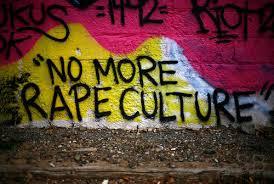Myth: If a woman is raped, she probably asked for it in some way.
Fact: Only the perpetrator is responsible for the decision to violate someone. 
This myth restricts women’s behavior and places blame on survivors rather than perpetrators. Women and those who identify as female are often expected to dress or behave in certain ways and to follow strict but contradictory rules to protect themselves from harm. This myth perpetuates the double standard that reinforces an expectation of male aggressiveness and the perceived responsibility of women to avoid any behavior that could be seen as provocative.
This myth also helps distance non-survivors from survivors. By insisting that a survivor played some role, others can alleviate their own fear of assault by assuming that certain behaviors will protect them from a similar circumstance. For example, if you believe women are partially responsible for being assaulted if they were drinking, then you can take comfort in the idea that you are not at risk if you don’t drink too much. Or if you believe women are partially responsible for being assaulted if they were dressed provocatively, then you can take comfort in the idea that you are not at risk if you dress more modestly.
But offenders select their victims not based on the way they dress, but rather on their perceived vulnerability. Rapists target people who seem vulnerable to assault and who seem less likely to report them.
Asking potential victims to be responsible for protecting themselves from victimization is a form of oppression. Only perpetrators are responsible for their behavior, and they should be held accountable. Even if you believe that women should adhere to certain behavioral standards – how they dress, how much they drink, who they spend time with, etc. – the consequences of not meeting these standards should never be rape. No one “asks” to be raped, and no one deserves to be raped. There is never an excuse, an invitation, or a justification for sexual violence. Bottom line.
This post is part of a series on Myths & Facts about Sexual Violence:
– Myth #1: “He Didn’t Mean To”
– Myth #2: “She Lied”
– Myth #3: “She Asked For It”
– Myth #4: “It Wasn’t Really Rape”


 I want to start an honest conversation about drinking and sex. I don’t want to say that drunken sex is always wrong and, most importantly, I do not want to victim blame. There is absolutely no question that affirmative consent should always be clear, constant, and coherent. If someone is intoxicated, they cannot give legal consent to a number of things, not just sex. After all, even in Vegas, you have to be sober to get married. Entering into any contractual agreement while incapacitated is usually voidable in the eyes of the law. This is because drinking is proven to decrease cognitive ability and awareness of risk. If you proposition someone while they are drunk, you are entering into dangerous territory, because this person may not be capable of assessing the situation.
I want to start an honest conversation about drinking and sex. I don’t want to say that drunken sex is always wrong and, most importantly, I do not want to victim blame. There is absolutely no question that affirmative consent should always be clear, constant, and coherent. If someone is intoxicated, they cannot give legal consent to a number of things, not just sex. After all, even in Vegas, you have to be sober to get married. Entering into any contractual agreement while incapacitated is usually voidable in the eyes of the law. This is because drinking is proven to decrease cognitive ability and awareness of risk. If you proposition someone while they are drunk, you are entering into dangerous territory, because this person may not be capable of assessing the situation.



 Whether your child hears the word rape in the news, reads it on the internet, or sees it on one of our materials, there are age-appropriate ways to talk to your child when he or she asks about it.
Whether your child hears the word rape in the news, reads it on the internet, or sees it on one of our materials, there are age-appropriate ways to talk to your child when he or she asks about it.
 Being introduced to the concept of rape culture changed everything. It changed my understanding of television, music, jokes, laws, and even language. When asked to write a primer for rape culture, I assumed it would be a simple task. Surely, I had been using the term for years, since taking a Women’s Studies 101 course at UNC. It took the better part of a week, however, to even start this overwhelming blog post.
Being introduced to the concept of rape culture changed everything. It changed my understanding of television, music, jokes, laws, and even language. When asked to write a primer for rape culture, I assumed it would be a simple task. Surely, I had been using the term for years, since taking a Women’s Studies 101 course at UNC. It took the better part of a week, however, to even start this overwhelming blog post.